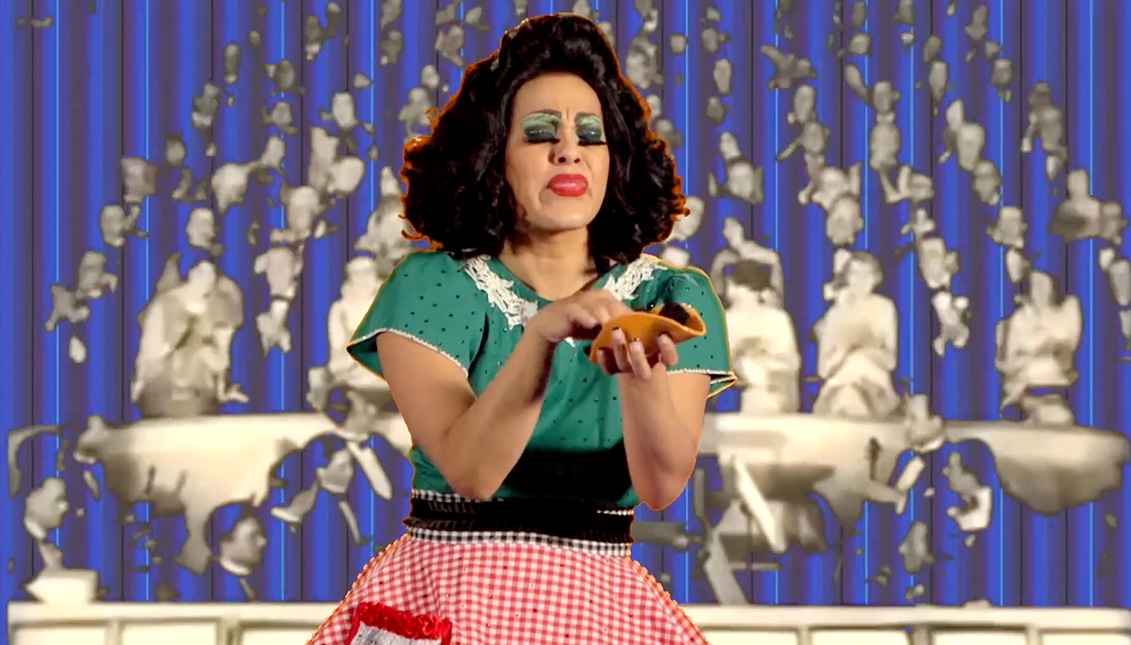
Art and Censorship: An artist's "too spicy" video that has censored the city of San Antonio
Artists and curators describe the city's decision to remove Xandra Ibarra's video as an "attack on the First Amendment." What's so offensive?
"The past never disappears, we are stuck with it, just like we are stuck within modernity. One just has to negotiate how to live with and against it at once," says Xandra Ibarra, aka La Chica Boom, the disruptive character she created and who the government of San Antonio, Texas, has been quick to suppress in the 21st century. Yes, we' re stuck.
Her video artwork "Spictacle II: La Tortillera" (2014) has been removed from a group show at the city's Arts Center for being considered "obscene." It didn't help that the curators of XicanX: New Visions - the exhibition that included the video art piece exploring the Chicanx and Latinx identity - had agreed to project the video in a curtained space and with a warning, officials censored it anyway.
Perhaps because, as Ibarra insists, while art is not required to be political or combative, "the display of sexual content continues to cause anxiety," adding that the goal of censoring works that address sexuality and racialized sex is the system's enforcement of "sexual normality."
A normality, or heteronormality, that the artist strikes like a piñata filled with clichés and conventions. That's why, because she doesn't "marry" anyone, she's so annoying for some. Because there is no way to classify her; hers is the art of transgression.
In the video, La Chica Boom is shown as a Mexican housewife masturbating with a pot of spice and two tacos. That's what they'll tell you at first glance.
However, the artist's explanation does more justice to the meaning of the work:
"I used sexualized tropes of Mexicanidad to create a parodic persona, called La Chica Boom. Through this self-other, I explored the embodiment of what I call “spichood” or my own racial and sexual abjection, themes mostly taboo in activist and community organizing circles I belonged to," she tells us.
"La Tortillera" - a name for lesbian women, an insult or not depending on who's talking - is a long-running work. Ibarra had begun to use burlesque and Mexican "low-brow" humor to conceive a series of performances that she called "spictacles" that were performed in bars and nightclubs and with which she sought to laugh at depictions of Mexican and Chicano sexuality and gender.
"In these performances, I perverted Mexican iconographic symbols (like cockroaches, Catholic virgins, piñatas, Mexican wrestlers/Luchadores, hot sauce) by combining them with sex acts like live masturbation, fisting and sex. While humor was very much a central part of this work, I didn’t have the intention to work toward recuperating these racialized sex acts; instead this project was an attempt to inhabit my sexed “spichood” and hyperbolize my supposed differences to discover queer forms of pleasure," she concludes.
However, not everyone thought so...
"It was a decision that the city had all the right to make in a space owned by San Antonio," said the director of the Department of Art and Culture, Debbie Racca-Sittre, who came out in the face of criticism from artists and curators who described the withdrawal of the video as "censorship and banishment of queer, sexual, feminist and Latinx creative expression," as well as "an act of discrimination and flagrant homophobia," according to the organizers of 'XicanX' on networks.
RELATED CONTENT
The issue was so high profile that even the National Coalition Against Censorship (NCAC), a non-profit organization that seeks to defend freedom of expression, had to intervene. Last week, NCAC wrote a letter to San Antonio Mayor Ron Nirenberg, stating that the removal of the video is a direct attack on the First Amendment of the Constitution.
The NCAC still went one step further and argued that the city's Department of Culture's definition of "obscenity" is "illegal," as it collides head-on with the historic 1973 case of Miller v. California. According to the so-called Miller Test, no material with literary, artistic, political or scientific value can be classified as 'obscene.'
"Although the work has a sexual content - as is the case with many contemporary artworks - it certainly does not meet the definition of obscenity held in Miller v. California," the NCAC letter notes. "By removing Ibarra's work from the exhibition at the Arts Center, the city of San Antonio is probably violating the artist's rights of free expression and exposing the city to both bad publicity and legal liability.
A native of Oklahoma but of Mexican descent, Xandra Ibarra does keep one promise: not to leave us indifferent. In most of her works, as in her latest series of sculptures 'Kill your darlings,' she confronts us with monstrosity, the taboos that surround us and the notion of identity as a construct that can be as dangerous as a plague.
"I make work that brings me joy and I enjoy threatening the grip that prescriptive nationalist discourses and their signifiers have on me whether they be Chicano, American, Native and/or Mexican," Ibarra states. The roots are like the pea plant to her, strangling while allowing what has been sown to grow, allowing a piece of work to bear fruit.
Can you fight prejudice through art, break it down once and for all? I ask her one of those questions to which one expects a hopeful answer.
"Stereotypes don't die, they are eternally in a cycle of renewal," she replies. And judging by the silence of the San Antonio government, that answer that sees no way out is like life, a set of chained obstacles to be overcome.











LEAVE A COMMENT:
Join the discussion! Leave a comment.